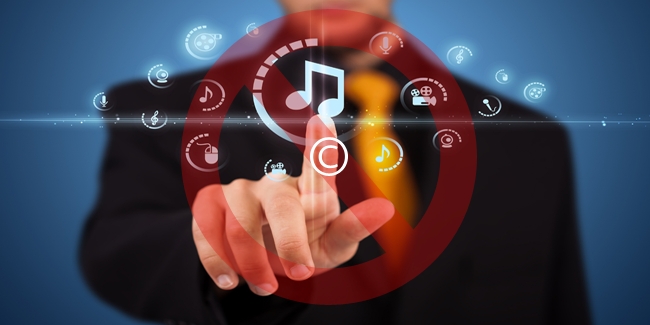Somewhere around then, people started adding music as well to their profiles that identified with their personality, a trend that grew and led to websites such as Spotify and Whyd.
The Internet has made sharing of music much easier compared to the days when you’d have to walk into an HMV store to buy a cassette you wanted to play on your walk-man! The vastness of the entire digital space has made it even easier for content to be available without any regard for restrictions (such as Copyrights) placed on them.
It's much more convenient and cost effective to listen to the music online, but where do you draw the line? In a recent report The Guardian quotes Ofcom to say, “The number of pirated music tracks in the UK has fallen by a third to 199m in the past year.” However still every one in six internet users have been noted to illegally stream or download music files, last year in the UK.
When content is freely available for stream or download, the fine line of legality is stretched thin. So when is it okay to 'play' or 'play with' music on the Internet? Let's find out.
-
Using and sharing music or music videos over the Internet, legally.
Legitimately, you can acquire music and videos only through services like iTunes and Amazon which provide you with options to buy individual tracks or videos. Alternatively, you can also subscribe for services such as Napster or sometimes even the artists might give away some of their content for free as a promotion. As long as you have the permission from the original copyright holder (author, publisher, performer, etc.) you should be fine, but read the permissions carefully because sometimes only a part of the work is allowed to be copied for personal, educational or research use. Such content usually has 'fair use guidelines'.
-
Streaming and downloading music videos from YouTube.
Under YouTube policies you can access content for your personal, non-commercial use, solely for streaming. So you are not allowed to make copies of the content without prior written permission of YouTube or the licence holder of that content. So, if you are downloading YouTube videos or streaming them offline through a third-party app, then it's not legal.
-
Knowing what you are doing is legal or illegal.
Unless and until you have permissions from the respective copyright owners to copy, translate, adapt, perform or stream a protected work or recording on the internet, or unless the copyright laws in your country allow you, doing any of the above is considered illegal.
-
Making copies for your personal use.
Refer to the specific copyright laws in your country for this as some countries limit the copyright owner's rights to allow for a limited amount of copies to be made, but strictly for non-commercial personal and private use.
-
Copyright on all music – including work that may no longer be available commercially.
Normally, all original work that is created is protected by the UK copyright law. For music and literary works this extends to 70 years after the death of the composer or author of the work, a sound recording is protected for up to 50 years from the year when it was first recorded and for a typographical edition it is 25 years from the year when it was published.
What you should also understand is that certain types of file sharing can potentially risk a legal action against you. Distributing copyrighted content without prior appropriate permissions might lead to civil or criminal action against you in a court of law. If someone (or some website) makes such copyrighted content available on the internet, it is considered as thieving, with the breach of law.
Remember that owners of copyrighted content regularly take actions against pirates and thieves around the globe to keep ill-practices in check. Internet service providers also help them in identifying and removing such content. Also, civil and criminal lawsuits are filed with punitive damages against the offenders.
Glossary
-
Copyright: The rights of an artist/owner that prevent transmission, copying and distribution of created content without their explicit permissions. (Read: How to protect your music in the UK? Know your rights)
-
Streaming: The act of watching a multimedia data file (usually audio or video) over the internet without downloading in on your device.
-
Third-party apps: Applications that are not made available (or authorised) directly by the first party (artist) or the second party (a service provider, such as YouTube).


